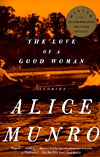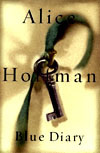
Comment
on this story
|
 |

Two Alices capture the inner lives of the xx set
by Jeanne McDonald
In a literary landscape glutted with mediocre books by media gurus and movie stars, those of us who hunger to read about life as it actually happens can still turn to the work of Alice Munro and Alice Hoffman. These writers have the extraordinary ability to insinuate themselves into the hearts and minds of other people, especially women, and the brilliance to show, artfully and accurately, what happens in those warm and secret places. Men are present in these stories, of course—cast as husbands, lawyers, doctors, even murderers—but it is the women who change the chemistry of their relationships. Emotionally hobbled by conservative upbringings or the tidy eras in which they came of age, they all are itching to break out of the dreary forms their particular backgrounds have fashioned for them.
In her poem, "Barter," Sara Teasdale wrote: "And for a breath of ecstasy/ Give all you have been, or could be." That's what these characters ache for—ecstasy, despite cost or loss—because pain, even in its rawest incarnations, promises more life-confirming sensation than an empty and mundane routine. In The Love of A Good Woman, a collection of short stories (Knopf, $24),
 Alice Munro introduces us to Pauline in "The Children Stay," a title that constitutes the retort of her husband when Pauline calls to announce she is not returning home. When she runs off with the director of an amateur production of Eurydice in which she plays the lead, Pauline's irrevocable act seems almost too easy: "What she was doing would be what she had heard about and read about. It was what Anna Karenina had done and what Madame Bovary had wanted to do...So her life was falling forwards; she was becoming one of those people who ran away..." As for her children, "...what pain. To carry along and get used to until it's only the past she's grieving for and not any possible present."
Alice Munro introduces us to Pauline in "The Children Stay," a title that constitutes the retort of her husband when Pauline calls to announce she is not returning home. When she runs off with the director of an amateur production of Eurydice in which she plays the lead, Pauline's irrevocable act seems almost too easy: "What she was doing would be what she had heard about and read about. It was what Anna Karenina had done and what Madame Bovary had wanted to do...So her life was falling forwards; she was becoming one of those people who ran away..." As for her children, "...what pain. To carry along and get used to until it's only the past she's grieving for and not any possible present."
In most stories, unlike real life, endings are tied up neatly, characters rewarded or punished, issues resolved and problems settled. Not so with Munro, who involves us intimately in the characters' lives and leaves us hanging when they step into darkness or danger. In the title story, Munro spins a web that encompasses many of the townspeople, illustrating the economic, moral, and social structure of the community, and then she carries us into the mind of Enid, a practical nurse who learns the identity of a murderer and places herself in harm's way by deciding to coax him to confess, sure that with the love of a good woman, he will decide to do the right thing. We are left wondering if Enid, too, will be killed, and thus Munro keeps us living in that story long after it is finished.
In "Before the Change," a young woman who has given up for adoption the child she conceived with her lover learns that her physician father has been performing abortions. When, in an emergency, she is asked to assist him, she realizes that her father might be performing the procedures out of love, and that her own lover, who refused to accept her pregnancy, is unworthy of her affection. In a final letter to him, she writes: "I send you my love. (What if people really did that—sent their love through the mail to get rid of it? What would it be? A box of chocolates with centers like the yolks of turkeys' eggs. A heap of roses slightly more fragrant than rotten. A package wrapped in bloody newspaper that nobody would want to open.)"
Alice Hoffman, though not as cerebral as Munro, presents an intriguing concept in Blue Diary (Putnam, $24.95). Ethan Ford, pillar of the community and faithful husband, is suddenly
 accused of having murdered a teen-aged girl 15 years before, and his adoring wife Jorie finds her perfect world disintegrating. What sort of allegiance does a wife owe a murderer who has been a faultless husband for 13 years? Slowly and surely, Hoffman illustrates how Jorie weighs her allegiance against the horror of her husband's deed.
accused of having murdered a teen-aged girl 15 years before, and his adoring wife Jorie finds her perfect world disintegrating. What sort of allegiance does a wife owe a murderer who has been a faultless husband for 13 years? Slowly and surely, Hoffman illustrates how Jorie weighs her allegiance against the horror of her husband's deed.
As a writer, Hoffman breaks almost every rule, leaping from past tense to present, from limited and omniscient points of view to first-person narrative. But her madness has method in it, magnifying the tension and immediacy of the narrative.
For the women in both these books, Munro's character Karin in "Rich As Stink" expresses a realization finally common to them all: "[S]he had become... something immense and shimmering and sufficient, ridged up in pain in some places and flattened out, otherwise, into long dull distances. Nobody knew the sober, victorious feeling she had sometimes, when she knew how much she was on her own." So, ultimately, are all these women on their own, and much the stronger for it.

January 10, 2002 * Vol. 12, No. 2
© 2002 Metro Pulse
|